by William Corey
Many people write and ask what it has been like to have spent over twenty-five years of my life photographing in Japan. They rarely ask about f:stops and shutter speeds, or cameras and films, but seem more curious to hear about the experience of being over “there,” in such a mysterious land, within such magnificent gardens, making photographs. I feel that the great gift we have been given as photographers are not the pictures, but simply the being “out there,”… the living of a marvelous adventure. For those of you so inclined, the following is an excerpt from my third book, CHASING THE DRAGON which talks about the making of this particular photograph.
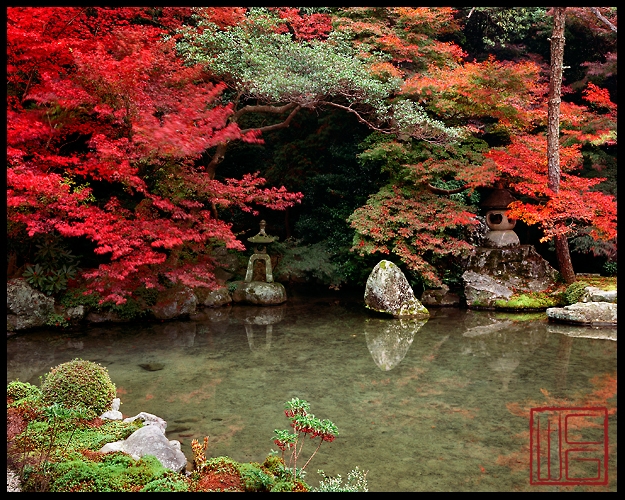
I pick my way across stepping stones, into the midst of the garden, each step turning my attention to a continual series of sequential focal points that heighten the sense of space and arrival. Instead of following a straight axis, the path veers — first left to focus on the splendid cypress trees, then right to capture a glimpse of a rock grouping on the pond’s shore. Irregular placement of the stepping stones force me to look down to watch my step; looking up, a new vista of the garden unfolds before me.
I reach the main building, slip off my shoes, and step up onto the veranda. What strikes me most, at once, is the transparent lack of space and at the same time how, astonishingly, it is translated into an inner imaginative spaciousness. It makes me feel as though I am going on stage, but rather a puppet theater than a real stage.
Without shoes it is very quiet, walking on fresh tatami (with a fragrance like that of a kind of rice tea), under the low, bare wood ceiling. The walls of the room are only paper partitions, and on two sides the opaque paper forms large solid panels, filled with marvelous and mysterious paintings. On the other two partitions where the light enters, the paper is thin, supported by a grid of light wood that divides it into an infinity of small transparent squares.
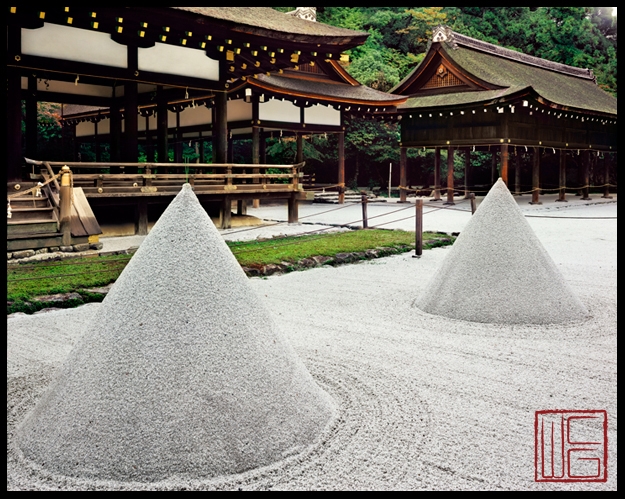
I slide back the delicate frames to reveal the garden outside, bathed in the soft light. Standing on the threshold of this room, now open to the air, its name rings in my ears, “The Garden of Pure Presence.”
With astonishing clarity the sweep and curve of this elegant and perfectly maintained garden, filled with a lush palette of plant materials selected to change color and shape throughout the year, seems to glow against the green backdrop of gently glowing hills. My eyes drift across the wide expanse of velvety moss, sleek with rain, to maples that look like trees of coral, so brilliant they appear to be in flames. The stream that flows around the small island, carved in a half circle, is speckled with every shade and hue of fallen leaves, and the placid waters shimmer with the bright colors. This gentle geometry of stone, water and wood, each element so carefully chosen and weathered for centuries has taken on such an antique patina that they look as if they have always been there.
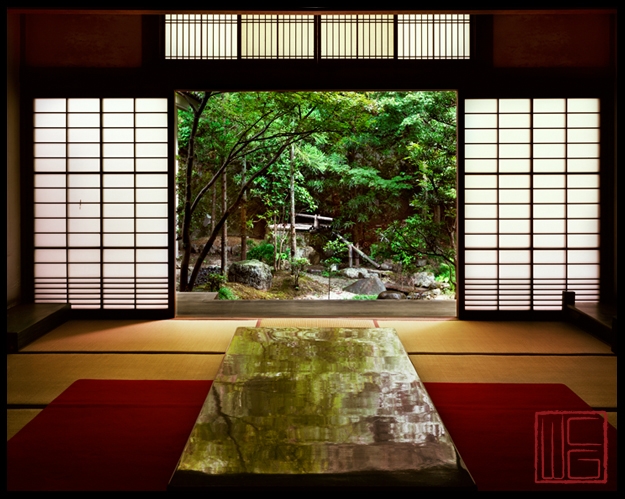
I’m reminded of the paintings preserved on the paper walls and try to envision once more, in the midst of this unchanging setting, the processions of long ago walking through this garden: the empress, surrounded by courtesans with large colorful parasols delightfully embroidered with flowers, walking with cadenced steps, within the scrupulous stiffness of garments that revealed nothing of their delicate figures: the war masks, the princes in their terrifying, bizarre magnificence; the emperors whom it was death to gaze upon, surrounded by “warriors with two swords” beheading the curious who dared to look: all that incredible pomp of old Japan, now gone forever beyond the reach of my imagination.
I lean forward with my chin pressed against the old camera, searching for the shapes and forms, colors and relationships — the core of feeling on which to construct this photograph. Behind my closed eyelids, I fade calmly into the elegiac color of distance and…
…I lock my hands on the wooden rail of the veranda and shake my head to and fro to clear it. It is so quiet, a particular stillness in this usually impenetrable garden, a silence all its own. I can almost feel the earth begin to breathe.
Then, nothing. tense, waiting, watching. I feel my whole body begin to change as I let the garden swallow me, so much so that I become a part of it. A lightness comes over me, a certainty — ideas, images.
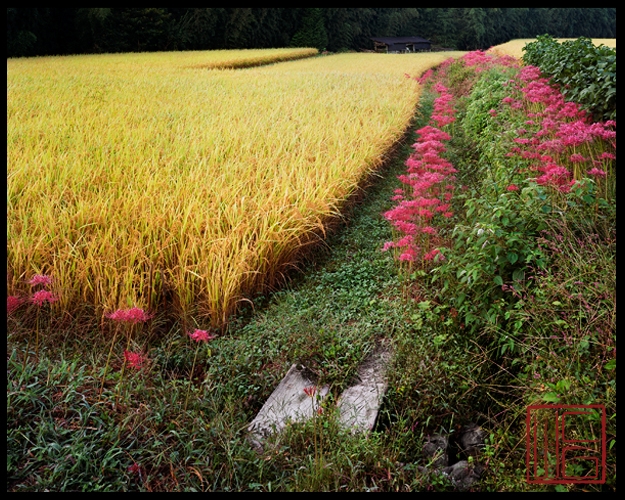
And it seems easy at first. I know exactly where I want to begin, and set up almost identically to where I had been the previous days. I move the tripod back as far as it will go — any further and I pick up the railing around the veranda, any closer and I lose the roof of the building.
But then I find myself with the same problem as before — the spacing of the five tall cypress trees. I have just enough space on the right to ‘walk around’ the fifth tree, but then I cut off most of the pond on the left. I keep telling myself that the pond doesn’t matter that much, but I know that this picture isn’t what I want unless I can bring the eye completely around it. That is the only way to get into it.
What if I disregard the fourth and fifth trees and just leave the right side open? Maybe that the way to do it. But then I have to sacrifice some of that wonderful sweep of color in the trees. Well, it has to be a compromise, but actually, now that I look at it, it seems to get me a little closer to what I want. Why didn’t I see that before? It seems to work, but there is still something missing.
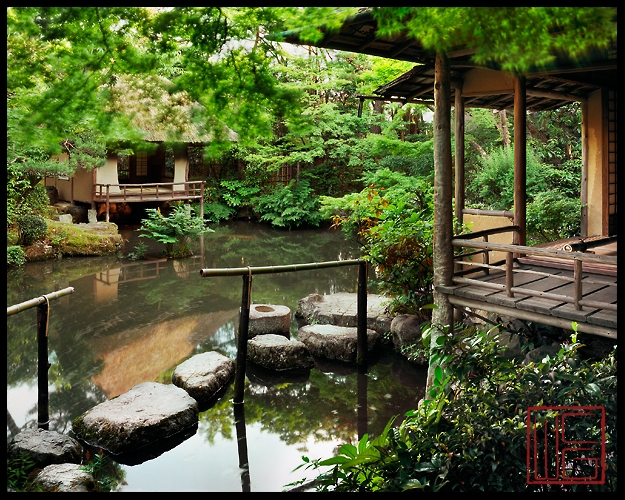
Thinking: I know that I have most of the elements, most of the ideas, and if something is missing, as I know it is, it will come — I know it will come.
One thing after the other — back and forth, right to left — it’s all a matter of inches, millimeters even. But wait a minute, maybe you don’t need to go around the entire pond — if you can just go around the three bushes that are in front of it, that may be enough. It may not be what I had in mind, but it just might work.
One thing after another — I have to make sure to include that one leaf at the base of the center tree. The moss forms a nice triangle there, it gives balance to the foreground. But then I have to give up some of the tree branches at the top.
I lose myself in the rhythm of what I am doing. I lose track of time I lose awareness of the garden itself. There is a space beyond the reality that is blank to me; perhaps I am not even present. I feel a power grow in me, but it does not feel like my own power. It is like forces beyond me are filling me, possessing me.

One thing after another — how do I expose for this? The light is beautiful — the moss is almost pulsating — everything seems realer than real. It’s coming, I’m almost there, just a little more — swing just a bit to the right again. That’s better. Now I’ve got it. Exactly what I want.
And suddenly I am aware of people talking and crowding around me, a lot of people. I look at my watch — nine o’clock. Have I really been here for three hours?
Someone says something about the strange camera. One or two, brave enough to talk to this alien, ask to look through the viewfinder. As usual, I have become as much a sightseeing attraction as the garden itself. I think it is time to go.
Nodding graciously, I leave slowly, majestically. I can hardly feel the cinder path under my steps. My feet touch air, I am floating. My body feels as if it is quivering, exhausted, fabulous. I’ve made it.